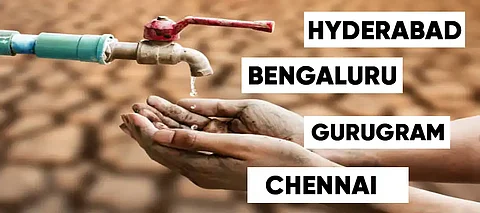

More than 4 crore people across four major metro cities, Hyderabad, Bengaluru, Chennai, and Gurugram, are bracing for a severe water crisis as lakes dry up and groundwater levels plummet. Weather experts predict temperatures will be 1-2 degrees higher this summer than last year, further worsening the situation.
In Hyderabad, 80% of borewells and 40 lakes have already dried up, imparting 60% of the city’s 1.3 crore residents. The maximum temperatures could rise to 44°C from last year’s 40-41°C. The city requires 600 million gallons daily (MGD) of water, but only 545 MGD is currently available. Groundwater depletion is worsening, with 8,000 out of 13,900 borewells now dry. In 1970, Hyderabad had 3,000 lakes; today, only 180 remain, and 40 have already dried up this year.
Bengaluru is already facing shortages, with groundwater levels falling to 25 meters in some areas. A study found that 80 out of 225 wards are high risk, and 110 surrounding villages are nearly dry. The city needs 2,600 MLD of water daily, with demand expected to double in summer. To tackle the crisis, the Water Supply Board is imposing fines of up to ₹5,000 for non-essential water use and urging residents to get Kaveri water connections, though supply from the river is not a long-term solution due to reduced rainfall.
Gurgram is also experiencing severe shortages, especially in villages where underground water has dried up. In Manesar’s Khoh villages, even at a debt of 1,000 feet, water is unavailable. The city receives 570 MGD of water, but the demand will rise to 650 MGD in summer. As temperatures soar to 47°C in May-June, water scarcity is expected to intensify. Currently, water supply depends on the Public Health Department and private tube wells, but additional restrictions may be needed.
Chennai is likely to see a 1°C rise in temperature this summer, which could increase water demand by 7%. With rainfall declining and reservoirs depleting, the city may struggle to meet its growing water needs.
The authorities in all four cities are urging residents to conserve water and take precautions. The crisis is expected to worsen in the coming month, making immediate action crucial to prevent a humanitarian disaster.